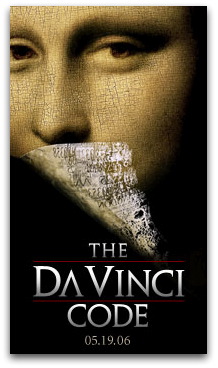The Da Vinci Code (Movie): A Brief Review
05/20/2006 23:53 Filed in: Movies and Television

I have no desire to write a full review of The Da Vinci Code. Everyone seems to be doing that, and most of the reviews are not that upbeat. Here are a few quick thoughts:
I'll be honest, bad theology and bad history aside, the book itself was a pretty good read. Dan Brown made you like the characters, especially Langdon. However, as is often the case, the movie just isn't as good as the book. The movie seems to me to be much darker than I remember the book. The book seemed--dare I say it--fun at times. This movie is not fun.
Robert Langdon will not be a memorable role for Tom Hanks. The movie version of Langdon is fairly two-dimensional and Hanks doesn't seem to have much freedom to expand the character in any given scene. Ian McKellan has the best lines and perhaps creates the best performance. In light of the actor's publicly stated animosity toward the Judeo-Christian tradition, his rant against Christianity toward the end of the movie is very believable.
This may be the only movie to ever reenact the Nicene Counsel. Of course, it's depicted as pure chaos.
I'm not sure if this movie will appeal to those who aren't already interested in the subject. In other words, if a person had no desire to read the book, will he or she go see this movie? Related to that thought, had I not read the book, I would have had great difficulty following certain plot points. Distinguishing between the Priory of Sion and Opus Dei would be a challenge for the uninitiated, in my opinion. And there were a number of scenes where the only reason I could follow the story was because I remembered the sequence of events in the book.
And here's a minor spoiler (look away if it's really an issue for you). What happened to the guy getting the girl? In the book, there's a kiss between Langdon and Neveu that definitely has romantic implications, and a promise is made to see each other again at a planned time. In the movie, there's no such kiss and only a vague promise to see each other again. What happened? Well, perhaps the director, Ron Howard, recognized while filming the picture that there just wasn't a whole lot of chemistry between Hanks and Tautou. Blame the casting director perhaps. Hanks was certainly not the first choice for this movie according to the Internet Movie Database, but I'm not sure anyone would have fared better. However, don't you wonder if there were two different endings filmed?
Personally, if I were Langdon, I would have qualms against becoming romantically involved with the living descendent of Jesus Christ. But maybe that's just me. And I guess if Jesus had descendants, he's really not the Jesus of the Bible, and we could agree that this is a major point of the movie anyway.
Finally, there's a scene at the end of the movie, which doesn't seem to be in the book at all, but perhaps was added because of all the controversy (I'm trying to find the exact dialogue, so maybe I'll come back and update this). Anyway, in one of the final scenes, Langdon says to Sophie, something to the effect, "It's up to you what you believe." And then, "Does it matter if Jesus was human or divine, since he's remembered for teaching love and peace?" Those aren't the exact words, but you get the idea.
Two problems. It does matter what you believe. Truth is not relative. And the theological problem in both the book and the movie is that it creates a false dichotomy between the divinity and humanity of Jesus. Was he a man or was he a God? It's not an either/or. The Bible presents it as a both/and.
Truth be told, I'm a bit weary of The Da Vinci Code. I'm teaching on it Sunday and Wednesday nights because I believe it needs to be addressed within and outside the church. However, based on the response I've heard from a number of Christians who have pondered if the claims in the book might possibly be true, I believe we may need to change our discipleship strategies a bit in our churches. That will be the subject of another blog in a few days.
As films go, If you want a better movie in this genre, go rent National Treasure. Lots of puzzles and codes, better acting and plot, more historically accurate, and much less offensive.
Redacted 5/21, 7:40 AM









